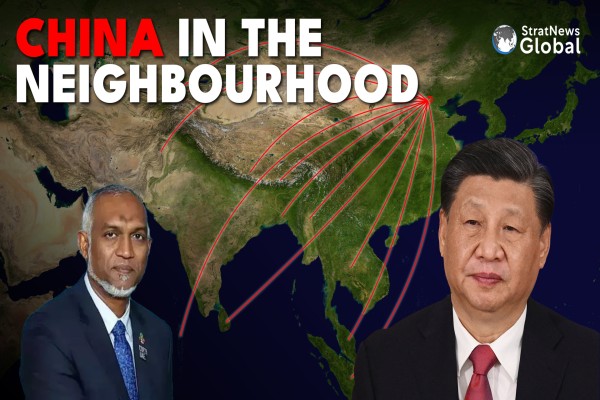The Maldives, an archipelago of some 1,200 islands in the Indian Ocean 600 km south east of India, its nearest neighbour, straddles one of the busiest sea lanes of the world, with a large chunk of commercial maritime traffic passing through its Exclusive Economic Zone.
The country, which gained independence from British rule in 1965, and became a republic in 1968, has traditionally had good relations with India, which was among the first nations to recognise it, and it is a critical part of New Delhi’s maritime security calculus.
China, on the other hand, established diplomatic relations with the Maldives with 1972, and though there were some bilateral visits, the relationship started taking off only in 2013 with the election of pro-Beijing president Abdulla Yameen, who also signed up for Chinese President Xi Jinping’s flagship Belt and Road Initiative (BRI), in 2014. Yameen also signed a free trade agreement with Beijing, but that was put on hold by his successor Ibrahim Mohamed Solih, who revived the country’s ‘India first’ policy.
Even though most of Maldives’ food, medicines and other essentials are shipped from India, China quickly became the country’s largest trading partner and investor, funding several large infrastructural projects like airport, bridges, and roads and resorts in the archipelago. This helped the country’s tourism industry, but also led to a lot of debt owed to Chinese banks, leading to fears of a debt trap.
In November 2023, another pro-China leader, Dr Mohamed Muizzu was sworn in as the 8th President of the Maldives, and one of his first steps was to demand that India withdraw the 90 soldiers and medics that helped operate and maintain the two helicopters and a Dornier aircraft donated by New Delhi earlier. He also scrapped a hydrographic survey agreement with the Indian navy arguing that his country could conduct such surveys on its own.
Muizzu, who came to power on an ‘India Out’ campaign, went to Beijing in January 2024 on his first state visit after becoming President, unlike his predecessors for whom New Delhi was always the first port of call.
Muizzu signed 20 agreements, including financial and what he described as ‘gratis’ or free military assistance, in Beijing, which laid out the red carpet for him. Several Chinese media reports sneered at India’s ‘unease and insecurity’ over the visit, as well as Male’s decision to allow a Chinese ‘ocean research vessel’, Xiang Yang Hong 03, to dock at a Maldives port.
Muizzu’s party won a parliamentary majority in April 2024, further strengthening his pro-China position.
India kept a diplomatic silence over Muizzu’s moves even as the media claimed the new naval base in Minicoy island 700 km north of the Maldives, was a response to Male moving closer to China.
Maldives is rolling out "Welcome India" campaign to woo Indian travellers back to the island nation. Tourism Minister Ibrahim Faisal will visit India to promote the campaign and re-establish Maldives as the ultimate holiday destination. #WelcomeIndia #Maldives #Travel #Tourism… pic.twitter.com/w7DZih44st
— Centre for Integrated and Holistic Studies (@cihs_india) August 1, 2024
But India almost doubled its budget allocation for Maldives in 2023-24 from Rs 400 crore to Rs 770 crore, and earmarked another Rs 600 crore for 2024-25.
This was over and above the $500 million loaned to Male in 2021 for building roads and bridges, and a $100 million line of credit in 2022 for other development initiatives.
Could the Maldives be falling into a Chinese debt trap?
“Yes, they are facing a stiff economic situation. Even by end-2022, both the IMF and the World Bank had indicated apprehensions about a massive balance-of-payment situation, especially relating to paying back overseas debts, a year from then,” says N Sathiya Moorthy, Chennai-based policy analyst & political commentator.
“So, when Muizzu took over as president, the situation was ripe for a burst. However, it may not be accurate to say that it allowed for Chinese debts. Even after the IMF-World Bank warnings, the then Solih government too went ahead with announcing/undertaking new projects and programmes, many of them unviable and election-centric. Now, Muizzu has announced that both China and Saudi Arabia have agreed to a five-year moratorium on the repayment of debts due to them,” he adds.
“India has to work on the assumption that the bad-blood created in the first few months of the Muizzu administration is all a thing of the past and the future holds much promise for bilateral relations,” argues Sathiya Moorthy. “Among regular creditors for India’s neighbours, it’s only New Delhi that is ready to extend budgetary support. Others like China and the US only provide project-funding.
“The IMF offers bail-out packages to indebted nations but their reforms-centric conditions, which include ‘rationalisation’ of taxes and tariffs, and also public sector jobs and pay-structures, have produced disastrous politico-electoral consequences.
“Muizzu should be aware of the way a popular president like Nasheed (2008-12) lost half his sheen after accepting the IMF’s reforms package. This made him approach India for fiscal aid, which is not linked to any IMF-like reforms packages,” he concludes.
.
In a career spanning three decades and counting, Ramananda (Ram to his friends) has been the foreign editor of The Telegraph, Outlook Magazine and the New Indian Express. He helped set up rediff.com’s editorial operations in San Jose and New York, helmed sify.com, and was the founder editor of India.com.
His work has featured in national and international publications like the Al Jazeera Centre for Studies, Global Times and Ashahi Shimbun. But his one constant over all these years, he says, has been the attempt to understand rising India’s place in the world.
He can rustle up a mean salad, his oil-less pepper chicken is to die for, and all it takes is some beer and rhythm and blues to rock his soul.
Talk to him about foreign and strategic affairs, media, South Asia, China, and of course India.





